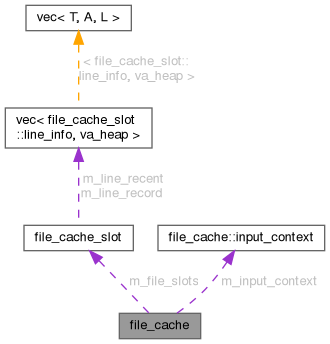#include <input.h>

Data Structures | |
| struct | input_context |
Public Member Functions | |
| file_cache () | |
| ~file_cache () | |
| void | dump (FILE *out, int indent) const |
| void DEBUG_FUNCTION | dump () const |
| file_cache_slot * | lookup_or_add_file (const char *file_path) |
| void | forcibly_evict_file (const char *file_path) |
| void | initialize_input_context (diagnostic_input_charset_callback ccb, bool should_skip_bom) |
| char_span | get_source_file_content (const char *file_path) |
| char_span | get_source_line (const char *file_path, int line) |
| bool | missing_trailing_newline_p (const char *file_path) |
| void | add_buffered_content (const char *file_path, const char *buffer, size_t sz) |
| void | tune (size_t num_file_slots, size_t lines) |
Private Member Functions | |
| file_cache_slot * | evicted_cache_tab_entry (unsigned *highest_use_count) |
| file_cache_slot * | add_file (const char *file_path) |
| file_cache_slot * | lookup_file (const char *file_path) |
Private Attributes | |
| size_t | m_num_file_slots |
| file_cache_slot * | m_file_slots |
| input_context | m_input_context |
Detailed Description
A cache of source files for use when emitting diagnostics (and in a few places in the C/C++ frontends). Results are only valid until the next call to the cache, as slots can be evicted. Filenames are stored by pointer, and so must outlive the cache instance.
Constructor & Destructor Documentation
◆ file_cache()
| file_cache::file_cache | ( | ) |
file_cache's ctor.
References initialize_input_context(), m_file_slots, and m_num_file_slots.
◆ ~file_cache()
| file_cache::~file_cache | ( | ) |
file_cache's dtor.
References m_file_slots.
Member Function Documentation
◆ add_buffered_content()
| void file_cache::add_buffered_content | ( | const char * | file_path, |
| const char * | buffer, | ||
| size_t | sz ) |
References evicted_cache_tab_entry(), gcc_assert, lookup_file(), m_input_context, and r.
Referenced by diagnostic_file::set_buffered_content().
◆ add_file()
|
private |
Create the cache used for the content of a given file to be accessed by caret diagnostic. This cache is added to an array of cache and can be retrieved by lookup_file_in_cache_tab. This function returns the created cache. Note that only the last m_num_file_slots files are cached. This can return nullptr if the FILE_PATH can't be opened for reading, or if the content can't be converted to the input_charset.
References evicted_cache_tab_entry(), fopen, m_input_context, NULL, and r.
Referenced by lookup_or_add_file().
◆ dump() [1/2]
◆ dump() [2/2]
| void file_cache::dump | ( | FILE * | out, |
| int | indent ) const |
References i, m_file_slots, and m_num_file_slots.
◆ evicted_cache_tab_entry()
|
private |
Return the file cache that has been less used, recently, or the first empty one. If HIGHEST_USE_COUNT is non-null, *HIGHEST_USE_COUNT is set to the highest use count of the entries in the cache table.
References file_cache_slot::get_file_path(), file_cache_slot::get_use_count(), i, m_file_slots, m_num_file_slots, and NULL.
Referenced by add_buffered_content(), and add_file().
◆ forcibly_evict_file()
| void file_cache::forcibly_evict_file | ( | const char * | file_path | ) |
Purge any mention of FILENAME from the cache of files used for printing source code. For use in selftests when working with tempfiles.
References gcc_assert, lookup_file(), and r.
◆ get_source_file_content()
| char_span file_cache::get_source_file_content | ( | const char * | file_path | ) |
References lookup_or_add_file().
◆ get_source_line()
| char_span file_cache::get_source_line | ( | const char * | file_path, |
| int | line ) |
Return the physical source line that corresponds to FILE_PATH/LINE. The line is not nul-terminated. The returned pointer is only valid until the next call of location_get_source_line. Note that the line can contain several null characters, so the returned value's length has the actual length of the line. If the function fails, a NULL char_span is returned.
References lookup_or_add_file(), and NULL.
Referenced by blank_line_before_p(), dump_location_info(), edited_line::edited_line(), edited_file::get_num_lines(), get_source_text_between(), get_substring_ranges_for_loc(), location_compute_display_column(), edited_file::print_content(), edited_file::print_diff_hunk(), and edited_file::print_run_of_changed_lines().
◆ initialize_input_context()
| void file_cache::initialize_input_context | ( | diagnostic_input_charset_callback | ccb, |
| bool | should_skip_bom ) |
References default_charset_callback(), and m_input_context.
Referenced by file_cache().
◆ lookup_file()
|
private |
Lookup the cache used for the content of a given file accessed by caret diagnostic. Return the found cached file, or NULL if no cached file was found.
References gcc_assert, i, m_file_slots, m_num_file_slots, NULL, and r.
Referenced by add_buffered_content(), forcibly_evict_file(), and lookup_or_add_file().
◆ lookup_or_add_file()
| file_cache_slot * file_cache::lookup_or_add_file | ( | const char * | file_path | ) |
Lookup the cache used for the content of a given file accessed by caret diagnostic. If no cached file was found, create a new cache for this file, add it to the array of cached file and return it. This can return nullptr on a cache miss if FILE_PATH can't be opened for reading, or if the content can't be converted to the input_charset.
References add_file(), lookup_file(), NULL, and r.
Referenced by get_source_file_content(), get_source_line(), and missing_trailing_newline_p().
◆ missing_trailing_newline_p()
| bool file_cache::missing_trailing_newline_p | ( | const char * | file_path | ) |
Determine if FILE_PATH missing a trailing newline on its final line. Only valid to call once all of the file has been loaded, by requesting a line number beyond the end of the file.
References gcc_assert, lookup_or_add_file(), and r.
Referenced by edited_file::get_num_lines().
◆ tune()
| void file_cache::tune | ( | size_t | num_file_slots, |
| size_t | lines ) |
Tune file_cache.
References m_file_slots, m_num_file_slots, and file_cache_slot::tune().
Field Documentation
◆ m_file_slots
|
private |
Referenced by dump(), evicted_cache_tab_entry(), file_cache(), lookup_file(), tune(), and ~file_cache().
◆ m_input_context
|
private |
Referenced by add_buffered_content(), add_file(), and initialize_input_context().
◆ m_num_file_slots
|
private |
Referenced by dump(), evicted_cache_tab_entry(), file_cache(), lookup_file(), and tune().
The documentation for this class was generated from the following files: